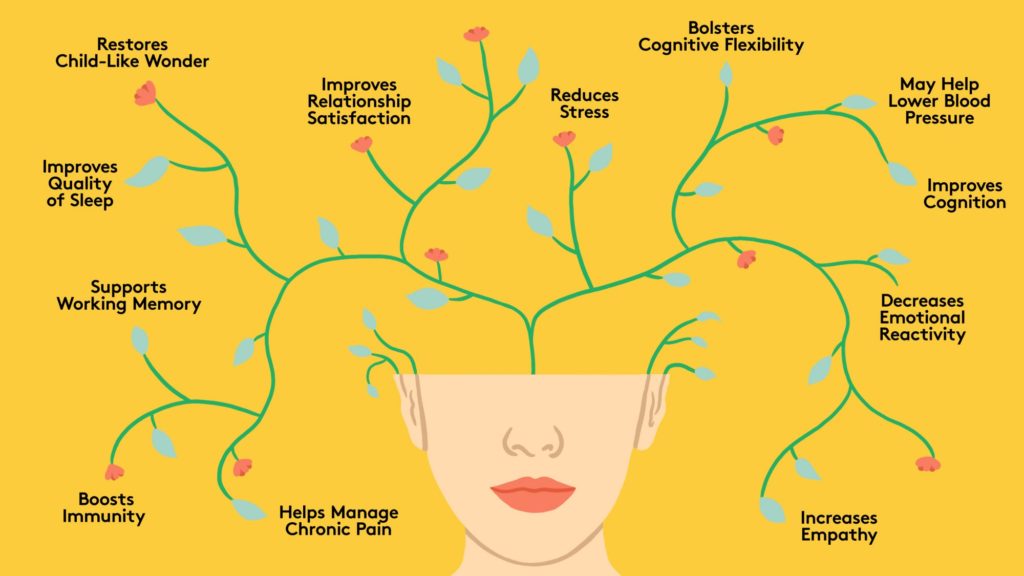
Over the past several years, and especially throughout the COVID-19 pandemic, mindfulness has become a new buzz word. You may have seen it mentioned in relation to topics such as pain, happiness, anxiety, stress, sleep, etc. The question is how can one concept have such far-reaching effects on all the previously mentioned areas? Is it possible that one idea can help you sleep better, feel less stressed, and manage pain better? The simple answer is yes. Mindfulness can change your life and here is how.
What is Mindfulness?
The American Psychological Association defines this as “…a moment-to-moment awareness of one’s experience without judgement. In this sense, mindfulness is a state and not a trait.” It is important to emphasize that mindfulness is not a character trait; it is not something that some people are born with and some without. It can be cultivated by any one, at any time.
Mindfulness has its origins in Buddhism. Buddhism recognizes that the only moment in life we can be certain of is the present. And when we truly live in the present, we are consciously aware of everything around us. Buddhists believe that living truthfully in the present moment fosters gratitude, contentment, and happiness.
In short, it means you are paying attention. It means you are aware of the beautiful sunset, you hear the birds outside your bedroom window, you taste every bite of food. So often we move through life without noticing. We don’t pay attention to the beauty around us and are instead absorbed by our own problems. This level of awareness requires you to step outside of your constant stream of rumination and pay attention to the world around you.
How to Practice Mindfulness
Meditation is a practice that involves becoming aware of your thoughts. It is entirely about the present moment. There are many different types of meditation but all of them involve heightened awareness.
Mindfulness meditation typically emphasizes conscious breathing and thought awareness. The practitioner sits still, in a comfortable position, and begins to just notice their breath. Notice the rate, depth, location, feel. As they focus on the breath, invariably their mind will wander. When it does, the goal isn’t to quickly bring their awareness back to the breath. The goal is actually to observe the thought. To step outside of the thought and pay attention to it. When we give thoughts attention they quickly fade. Then the awareness returns to the breath.
Periodically, it is also advised to check in with the body. Notice the skin temperature, the smell of the room, the sounds in the background. These practices ground the practitioner in the present moment. This meditation can be practiced anywhere, for any length of time.
Mindfulness can also easily be incorporated into daily activities. Since by definition it means that you are fully in the present moment, you can apply this awareness when you are eating, working, relaxing, etc. All it takes is remembering to pay attention to what you are doing. If you notice your mind wandering off, gently bring it back. Don’t get frustrated if you continue to notice extra thoughts or concerns about the future, this is normal. This is a practice and it will never be perfect.

Cognitive Improvements from Mindfulness
Much research has been conducted about the effects on different aspects of cognition. Outlined below are several areas that can be improved through focused practices:
- Stress
- In one research study, participants were assigned to an 8-week mindfulness-based stress reduction group and compared to a control group. The researchers wanted to compare the participants’ neural activity from watching a sad movie.
- They found that the people in the mindfulness group demonstrated less neural reactivity when they were exposed to the sad movie, compared to those in the control group.
- These findings show that mindfulness training can have significant rewiring effects on the brain and result in a better ability to regulate emotional reactions.
- Focus
- In another study, researchers compared experienced meditators to non-mediators on outcomes looking at attention, and focus.
- They found that the meditation group had significantly higher scores on all measures, which is consistent with “cognitive flexibility and attentional functioning.”
- Adaptability
- Research has also confirmed that individuals who practice mindfulness meditation have the unique skill of self-observation. This is the ability to disengage from automatic responses (established from prior learning) and make decisions based on information from the present moment.
- In addition, this awareness activates the part of the brain associated with positive adaptive responses to stressful or negative situations. Activation of said area of the brain is related to faster recovery to baseline.
Physiological Improvements from Mindfulness
Not only can mindfulness practices improve our mental health, it has also been shown to improve our physical health and functioning.
- Heart health
- Heart disease is consistently a leading cause of death in the United States. Researchers have started to examine whether or not mindfulness practices, in addition to other interventions such as medication, can be helpful in managing/preventing heart disease.
- One such study found that people with pre-high blood pressure who took a course in mindfulness had significantly greater reductions in their blood pressure numbers when compared to a control group.
- Mindfulness practices have also been shown to improve heart rate variability, (HRV) which is the ability of the heart rate to change depending on the situation. A high HRV is associated with better overall health.
- Immune system
- T-cells are one type of immune cell that circulate in our blood and help fight infections and viruses. Several studies have proven that performing mindfulness practices can actually increase levels and activity of T-cells. This means that we are able to better fight off disease.
- Studies have also shown that inflammatory markers are decreased in people who practice mindfulness meditation compared to those who don’t.
- Pain response
- Pain originates in the brain. As a result, each individual’s experience of pain is different and depends on their physical well-being, mental state, past experiences, etc. When we are stressed and/or not in good health, we feel pain more intensely. For more information about pain and your nervous system check out this blog post: https://charmaustin.com/pain-relief-changing-nervous-system-input-neufit/
- As previously outlined, practicing mindfulness can help improve a person’s ability to handle stress and remain focused and attentive. These strategies can also be applied to dealing with pain.
- Mindfulness can help people become less attached to their pain. They are able to become aware of the physical symptoms without obsessing or ruminating on discomfort.

In short, mindfulness is synonymous with awareness. It can be nurtured through simple practices such as meditation and have profound effects on mental and physical health. It’s time to start paying attention.
Sources:
- https://www.apa.org/monitor/2012/07-08/ce-corner
- https://greatergood.berkeley.edu/article/item/five_ways_mindfulness_meditation_is_good_for_your_health
- https://www.mindful.org/meditation/mindfulness-getting-started/
- https://www.mayoclinic.org/healthy-lifestyle/consumer-health/in-depth/mindfulness-exercises/art-20046356





